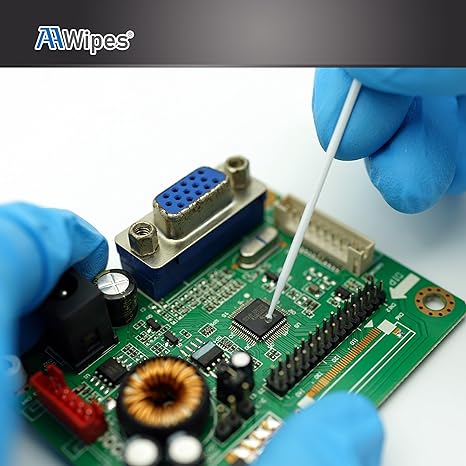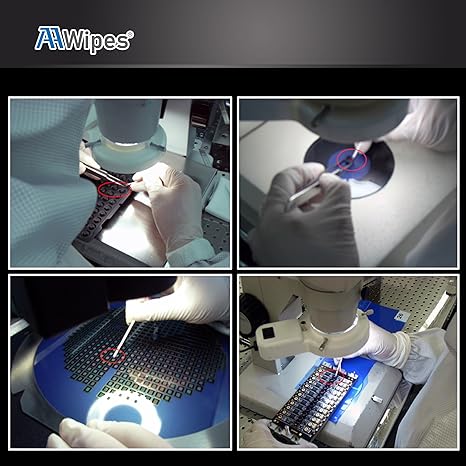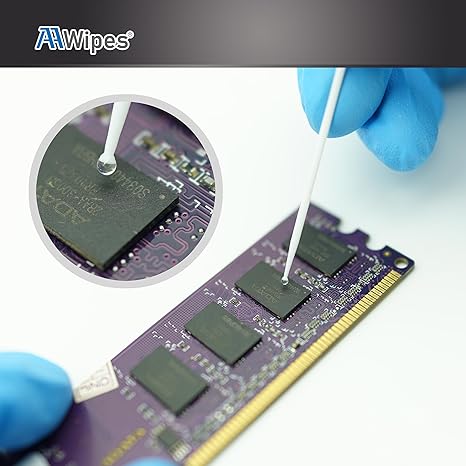Description
Material & Design
Our Gel Sticky Pen Swabs feature a transparent silicone gel head with strong adhesion to lift dust, oil, and particles from delicate surfaces. The soft yet durable gel ensures no scratches, while the ABS handle provides firm control. Compact and flexible, they easily reach tight areas.
Key Features
-
Precision Cleaning: Safely removes dust, oil, and fingerprints from camera sensors, wafers, lenses, and optical glass.
-
ESD Safe: Built with antistatic control to protect sensitive electronics.
-
Low Residue: Ideal for cleanroom use (ISO 10–5000) with minimal particle generation.
-
Reusable: Each swab can be used up to 60 times, reducing costs.
Applications
-
Electronics & Semiconductors: Wafer parts, LCD/LED panels, HDDs, sensors.
-
Optics: Lenses, microscopes, precision instruments.
-
Cleanroom Industries: Biotech, pharmaceuticals, aerospace, medical devices.
-
Consumer Electronics: Smartphones, cameras, repair & maintenance.
Packaging
-
Box of 100 individually packed swabs
-
Length: 7.5 cm (2.95") | Head Diameter: 2.5 mm (0.1")
Why Choose Us
-
High-viscosity silicone gel for reliable cleaning
-
Cost-effective, reusable up to 60 times
-
Trusted by electronics, optical, and cleanroom industries
Want to become an AAWipes distributor or unlock exclusive wholesale discounts? Apply now!
👉 Distributor Application Form
Curious about our quality? Request a free sample today and experience it firsthand!
Certification Download:
👉 SDS
FAQ - Gel Sticky Pen
-
What is the Gel Sticky Pen made of?
It features a soft, high viscosity silicone head attached to a sturdy ABS rod, designed for precise cleaning of sensitive surfaces. -
What is the Gel Sticky Pen used for?
It’s perfect for cleaning small electronics, camera sensors, optical lenses, and delicate components in cleanrooms and other sensitive environments. -
How do I use the Gel Sticky Pen?
Press the sticky gel end onto the surface and pull it off to pick up dust and contaminants. Each swab is reusable up to 60 times. -
Can I use the Gel Sticky Pen with solvents?
Yes, it works well with isopropyl alcohol and other solvents, helping to dissipate static charge quickly. -
How long can I reuse the Gel Sticky Pen?
The swab can be used up to 60 times before it loses its effectiveness. -
Is it safe for all electronic devices?
Yes, the Gel Sticky Pen is designed to be safe for cleaning delicate electronics, such as sensors and screens. -
How should I store the Gel Sticky Pen?
Keep it in the dust-free storage box to maintain its cleanliness and effectiveness.
You may also like
Recently viewed
-
5(4)
-
4(2)
-
3(1)
-
2(0)
-
1(0)
My camera sensor had a particle that would not yield to a blower, a "dust it Platinum stick", AND a wet swab wiping. So, I got these gel sticks. After practicing on some lens glass, I found the stick leaves no residue (well, that may be impossible, but you get the idea, no residue to worry about). I tried dabbing the stick on the particle, two dabbings removed the stubborn particle. I leave others to speculate as to why this stick worked and the "dust it Platinum" did not. What a relief!
These work great for removing dust and particles from watch movements and dials. Easy clean up with water and ready for many reuses.
Economical, easy to use swabs that safely remove dust and other accumulated particulates from lens, mirrors, etc.
I have a Sony A7RIV and I'm not afraid to change lenses in the mountains or beach. This means my sensor collects dust/debris. I like to use this first to remove the debris I can easily see using a magnifying glass. I hold the magnifying glass in my left hand and the gel stick in my right and lightly tap on the dust and it comes off. I then only need one wet sensor swab to finish cleaning the sensor. If you change lenses outside in all conditions then I think this is a good product. For wh…at its worth blowers only blow dust around inside your camera that eventually lands back on your sensor.
If you have a DSLR then you have to clean the sensor and lenses-no way out of that. These work very well but they are a bit overpriced for what you get. However, they are handy and small so that is a plus. In a nutshell, it all depends on your needs and budget. If you are on the go and want to travel as lightly as possible, then check these out. They are nice to have on hand because dust can crop up anytime and can ruin your photos and equipment.
I'm not a huge fan of having to touch my camera's sensor, I'm always afraid of damage. But this work well actually. If you have some hard to removed specks of dust, that say a blower bulb can't seem to blow off or the static brush won't grab, these will get it. You need very very little pressure and there is no residue left behind. Good to keep in your cleaning kit.
I got this to clean the sensor of my mirrorless camera. I have had the camera over two years and was noticing significant spots.What I found is these sticks are ok for removing large spots you can see with just my eyes or reading glasses. However, I've found that most spots on sensors are so small that it just won't be possible to remove them, because they are too small to be seen. For these a wet sensor swab is still the best remedy.Here is my workflow:First, be careful cleaning your camera's… sensor. Particularly with mirrorless cameras that have in-body stabilization, you can damage that mechanism causing a costly repair.Second, hold the camera with the sensor facing down if possible. You don't want to put more dust into the sensor by holding it facing up.1. Take a reference photo of an out-of-focus white area, at a high f/stop like f/22. Blow it up on your computer monitor. Dust spots will appear as grey circles.2. Blow off the sensor with a blower specifically designed for camera sensor cleaning.3. Repeat step 1. If the sensor is still dirty, proceed to the next step.4. Blow the sensor on a clean, soft brush designed for sensors. Blowing charges the brush with static, and specks of dust will transfer from the sensor to the brush. Brush off the sensor.5. Repeat step 1. If the sensor is still dirty, proceed to the next step.6. If there are spots you can see with reading glasses or just your eyes, use these gel sticks to remove them.7. Repeat step 1. If the sensor is still dirty, proceed to the next step.8. If you are comfortable wet-cleaning the sensor, follow the instructions in the kit you bought to wet clean. You may have to do this two or more times, with reference photos between, before all of the spots are gone.In the end, these gel sticks are one tool of several you should have for keeping your camera sensor clean. They won't work all by themselves, but they can be helpful.











